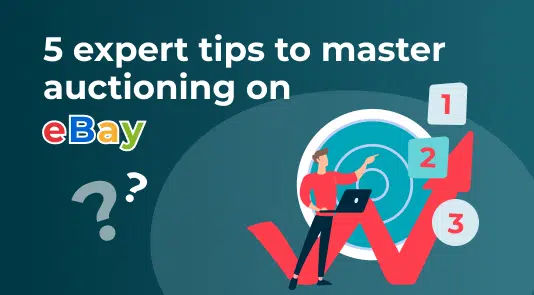Auctions are an integral part of selling on eBay. For a long time, auction-type listings were the only kind you could make on eBay.
Now, you have the option to make fixed-price listings. Contrary to popular opinion, auctions still perform well on eBay.
Since eBay stopped reporting Auction and Fixed-Price format back in 2017, we can’t know for sure the exact percentage of auction format listings on eBay. However, back in 2017, auctions still made up 13% of the gross merchandise volume (GMV) on eBay, according to eCommerceBytes.
In this article, I am going to share with you the most reliable eBay auction tips you can get your hands on.
Auctions are especially important for sellers of one-of-a-kind collectibles, memorabilia, and vintage items. Also, new sellers on eBay can list up to 250 auction-type listings completely free.
Auctions can help you attract buyers to your listings.
There are different types of auctions, but they all follow the same basic process. Auctions differ from fixed-price listings by not having a predetermined price beforehand.
This gives the buyer a bit of leeway in terms of how much they buy the item for. It also gives the seller a chance to make much more than they expect on the sale of the item.
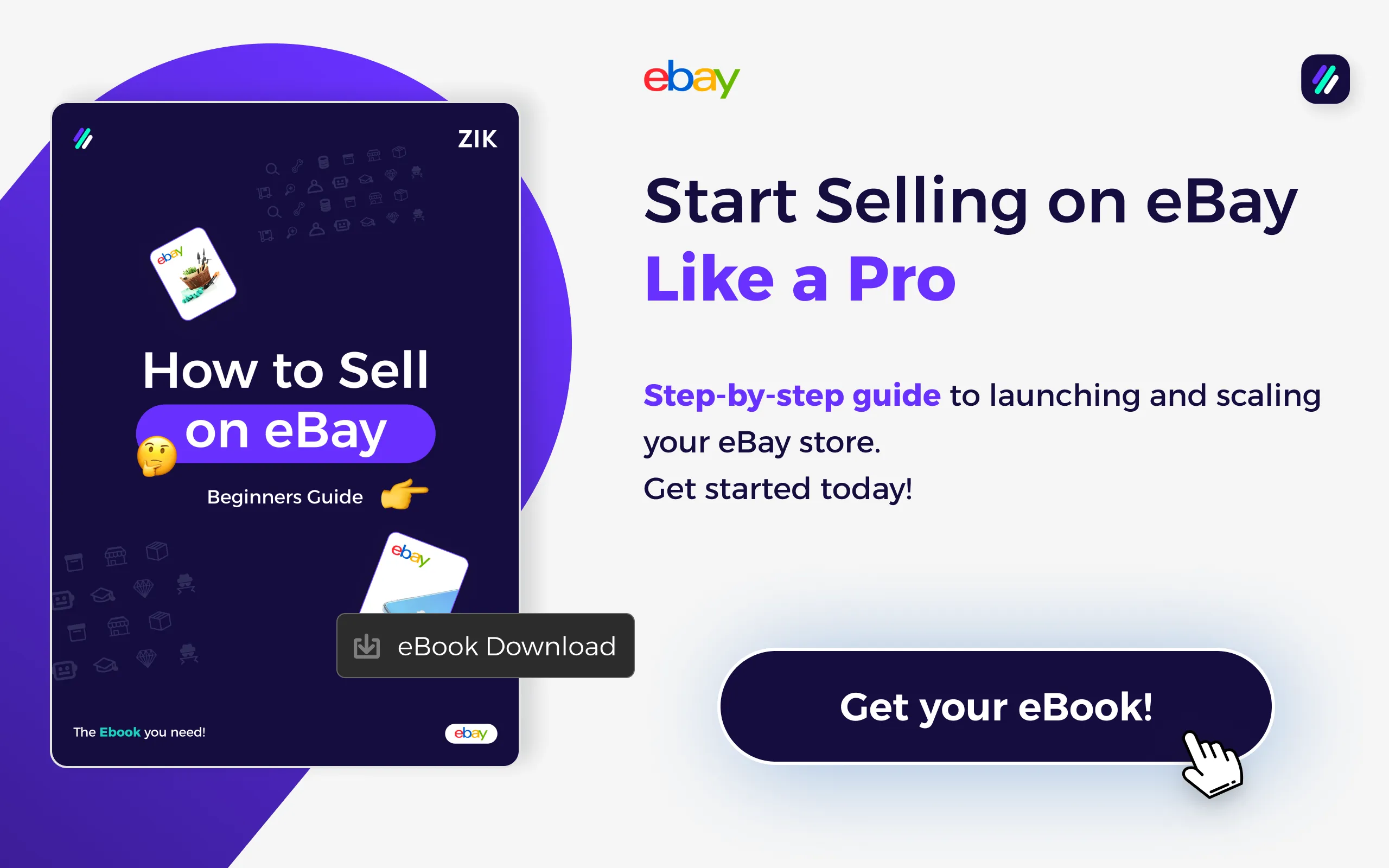
How do eBay auctions work?
As mentioned earlier, there are mainly two listing formats on eBay: auction listings and fixed-price listing. Other formats also exist such as Good till Cancelled and Fixed Price with Best Offer.
To make an auction style listing, you list the item with a starting price and choose a listing duration.
eBay auctions are unlike traditional auctions, in the sense that rather than being determined by an auctioneer, the final selling price is the highest bid by the time the listing duration ends.
eBay auctions generally follow this process:
- The seller lists their item and sets a starting bid price.
- The seller selects a listing duration of either 1, 3, 5, 7, or 10 days.
- You can add a reserve price as the maximum price you are willing to accept for the item. Buyers can see that there is a reserve price in place but not the actual price.
- Buyers see the listing and bid on the item.
- The highest bidder that meets the reserve price wins the auction and the item.
For auction style listings, the listing duration can vary from one day to over a week but they don’t last as long as fixed-price listings (one of the limitations of auctions).
The highest bidder wins the bidding war when the auction ends. The fact that the final price remains a surprise until the very end is the best part about auctions for many sellers and buyers.
5 Best Tips To Master Auctioning on eBay
1. Provide Privacy for Bidders on Sensitive Goods
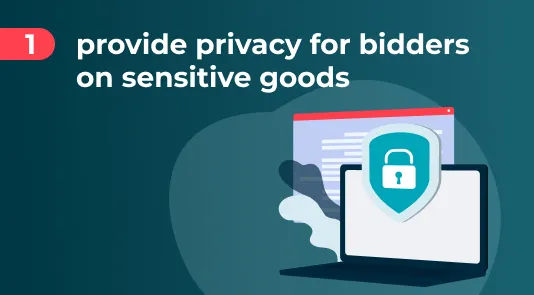
It is recommended that you set your settings to private for items that might be sensitive and for which buyers would like some discretion.
Public eBay listings might turn away potential buyers who prefer their online activity to be confidential. A private listing could attract shy buyers and increase the number of bids on your listing.
Private listings on eBay are few, compared to public listings, but they are very helpful to some buyers. Creating a private listing is easy and costs no extra fees.
To mark your listing as private, simply choose the option “Private listing” in the selling form, where you choose how to sell your item. Making a listing private means that buyers won’t see other people who have bid on the item.
If you are selling items such as adult products or medical items, you should consider making the listings private.
Apart from helping to attract buyers who value discretion, it will also help you get more feedback on your listings.
Private listings are not only for sensitive items; you can also use them for gift-themed items where buyers most likely don’t want their purchases to be viewed publicly.
2. List Your Goods for 10 days
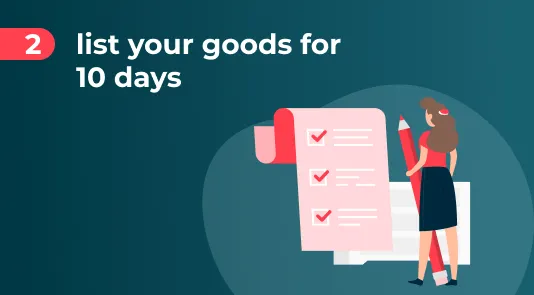
You can run your eBay auctions for 1, 3, 5, 7, or 10 days. Ten days is the longest an eBay auction can run. Obviously, it will be advantageous to let your auction run for the longest time possible.
eBay actually charges $1 per listing for every listing duration that is less than five days.
The longer your auction is up and running, the more exposure to prospective buyers and the higher the chance for competing bidders to drive up the price. If you need a listing duration that is more than ten days, you’ll need to choose the fixed-price format.
This doesn’t mean that shorter durations don’t have their perks. They help to give your listings a sense of urgency and are particularly excellent for time-sensitive items.
It is up to you to change the eBay listing duration that fits your product.
3. Start your Auction on a Thursday Night
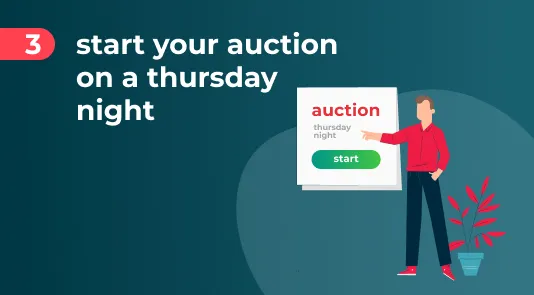
The day you start your auction determines the day it ends and how many bids you will get. There are certain start and end days that favor sales more than others.
For a lot of buyers, Sundays produce the highest number of sales. According to David A. Karp, writer of eBay Hacks, Sundays are widely regarded as the best day to close an auction.
So, if you start a 10-day listing on a Thursday night, it will end on a Sunday evening and it will be active for two Sundays instead of just one.
You should definitely still take the time to observe your market carefully and find out what works particularly for your product.
4. Allow Returns
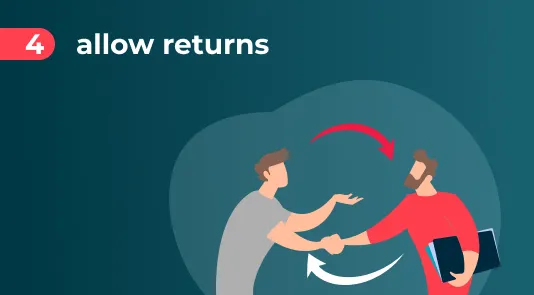
This is always considered good practice for selling on eBay. Every serious seller needs to offer at the very least a 30-day return policy.
It is important to note that every seller on eBay already offers returns by virtue of using the platform. eBay has a Money Back Guarantee policy for items that either didn’t arrive, are defective, or do not match the listing.
Offering returns on your terms is much better for your business.
Offering returns reduces the fear of buyer’s remorse that might prevent some people from bidding on your item, and gives them a sense of security, and they will be willing to pay a little extra for that. Also, eBay boosts listings that offer an eBay return policy of 30 days or more.
If you don’t offer returns in your store already, offer a 60-day return policy. Contrary to common opinion, a return policy with more days doesn’t affect your number of returns.
eBay gives you the option to manage returns automatically if you find you can’t spare the time to handle them manually.
5. Offer Free Shipping

These days, buyers expect free shipping, and they are put off if you don’t offer it. Both Amazon and eBay give special attention to listings that offer free shipping.
They use formatting and wording that make sure buyers note which sellers offer free shipping. They also allow customers to filter out sellers that don’t offer free shipping.
For these reasons and more, you should consider offering free shipping in your store. If you sell light, small items, offering free shipping can be a good way to boost your sales.
If you sell heavy items, however, free shipping can cut into your margins too much. So, consider your offerings and the market before making your decision.
Download this eBook now and learn how to sell on eBay like a pro.Conclusion
Auctions are a great way to make more money on eBay. There is a gradual learning curve to learning how to use them well, but they can boost your sales and increase your profit margins.
In addition to the points addressed in this article, you will need to conduct careful product and market research to find out what items sell best at auction and also when they sell best.
Ultimately, the best way to conduct an eBay auction listing is the one that gets you the most sales.
What are your best tips for auctioning on eBay? Let us know in the comments.
Sell Smarter with Data-Backed Auctions
Running auctions on eBay isn’t just about timing—it’s about choosing the right products that attract bidding wars. With ZIK Analytics’ eBay Product Research Tool, you can uncover items with strong demand, study competitors, and predict what sells best at auction.
Frequently Asked Questions on eBay Auction Tips
Here are some frequently asked questions about eBay auctioning tips:
How do I get the most money from eBay auctions?
To get the most money from eBay auctions, start with a low opening bid to attract interest, use clear photos, write keyword-rich titles, and end listings during peak hours. Offering combined shipping, detailed descriptions, and promoting eBay listings can increase bids and final sale prices.
What are the best items to auction on eBay?
The best items to auction on eBay are collectibles, antiques, rare coins, vintage toys, trading cards, luxury watches, and limited-edition sneakers. Auctions work well for scarce or in-demand items where competition drives prices higher. Everyday products usually sell better at fixed-price listings.
How do you add a reserve price to an eBay listing?
To add a reserve price on eBay, create your listing and select the Reserve Price option under pricing. Enter the minimum amount you’ll accept. eBay charges a fee for this feature. If bidding doesn’t reach the reserve, you’re not obligated to sell
What is the best strategy to win an auction on eBay?
The best strategy to win an auction on eBay is sniping, placing your highest bid in the final seconds. This reduces the time for others to respond. Research the item’s value, set a maximum budget, and use automatic bidding tools if you can’t monitor the auction.
Is auction the best way to sell on eBay?
Auctions work best for rare, collectible, or high-demand items where competition can raise prices. For common products, fixed-price listings usually generate quicker and more consistent sales. Many sellers combine both methods, using auctions to test demand and fixed prices for steady, reliable income.
Is eBay auction safe for sellers?
Yes, eBay auctions are generally safe for sellers, but risks exist. Issues include non-paying bidders, returns, or disputes. Using clear descriptions, accurate photos, and requiring immediate payment for Buy It Now can reduce problems. eBay’s seller protections also help resolve fraudulent or unfair buyer claims.
Is it worth selling at auction?
Selling at auction is worth it if your item is rare, collectible, or in high demand, as bidding competition can raise the final price. For common or low-value items, fixed-price listings usually yield faster, steadier sales without the risk of undervaluing inventory.












